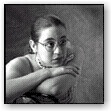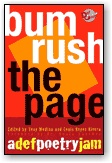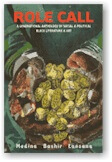More Poetry!/Less Jam!
by Tara Betts
 More Poetry!/Less Jam!
More Poetry!/Less Jam!
by Tara Betts
Bruce George’s outgoing voicemail message at Phat Farm states "Don’t leave a message unless it’s absolutely necessary!" and then offers the address where hopeful poets can send their audition tapes for a one-poem-shot on Def Poetry Jam. This HBO showcase and the 283-page anthology, "Bum Rush the Page: A Def Poetry Jam" are backed by Russell Simmons. The 30-minute series, similar to its Def Comedy Jam predecessor, with a simple stage, microphone and occasional podium, aired five episodes from December 2001 and January 2002. Poets across the country have been scrambling to turn in tapes to be in the next round of episodes, which explains George’s succinct message.
Poets are scrambling to get the commercial attention for their work, as an outlet for other opportunities. Despite the rush of some artists to get on the show, some poets feel that the popularization of poetry via Def Poetry Jam might destroy the integrity of poetry by people of color, and poets in general. Editor and poet Tony Medina makes this point clearly in the Bum Rush the Page introduction: A good number of folks running around calling themselves poets care less about poetry than about blowing up. When I first hit the New York scene running (some 12-odd years ago), we used the term blow up with regard to saying something political or profound, not about seeking some sort of fame or fortune. Poets I ran with talked about dropping bombs or blowing up the spot like rappers talked about dropping science it was about saying something deep and powerful—and leaving a hole in the stage! It is that same stage that haunts us today.
Serious poets who also happen to perform well on stage are constantly being called "Spoken word artists" and are not taken seriously as writers. Poets (especially those of color) who use words to effect change are therefore ghettoized by those who confer critical approval as simply oral, urban, or street poets. In other words, they are not real writers because they’re not busy polishing their poems until they virtually disappear, creating verse to decorate the parlors of the rich and bloodless.
| "I think that the show is doing a good thing in introducing performance poetry to a larger audience" |
Although much of the writing in Bum Rush the Page reflects this struggle to offer meaningful messages with craft and artistry, many other writers and viewers have mixed feelings about the televised Def Poetry Jam offering the same substance. Kenji Jasper, author of the novel Dark, is one of those writers/viewers. "I think that the show is doing a good thing in introducing performance poetry to a larger audience. But at the same time, I myself would probably not participate due to the kind of material the show showcases. Jasper added "I found it to be very well performed but lacking in content… And that is the thing that concerns me the most, that anyone could watch this and have an extremely skewed idea of what poetry is."
Veronica Bonahan of Chicago also expressed mixed emotions of gladness that the show offers poets opportunities but simultaneously voiced concern about "Dumbing down the art form." "I get annoyed with those that haven’t found their own voice and want to be Saul Williams in Slam. The hollering and quick speech is used as a cover-up for poor writing. I think that several people on the mike cannot write, but have mastered the art of delivery." She advises listeners trying to siphon out true poetry from bombast, "I often close my eyes to hear what they are saying so that I don’t get caught up in their performance skills, and often there is no continuity, there is no focus, just ranting,"
Although there is much critique that exists between page and the stage, within and outside of Def Poetry Jam fronts, there are some educators and poets who find this showcase to be a plus when reaching out to students and people expressing a fledgling interest in writing. Kenny Carroll, Executive Director of the DC WritersCorps, sends accomplished writers into schools to work with youth. Carroll knows teachers who are using the show to teach poetry and performance to young people. "Just as he (Russell Simmons) expanded the opportunities for Black and minority comics with Def Comedy Jam, I think he’s providing opportunities especially for Black and minority poets. He’s also expanding our notion of what poetry is and who poets are, while at the same time paying homage to great poets who have paved the way," Carroll said. Karima Amin of New York’s Langston Hughes Institute and Frank X. Walker of the Affrilachian Poets echoed this sentiment. "As an artist/educator, I have to support a project that has the potential to make more people pick up books, introduce literary icons like Baraka, Giovanni and Sanchez to new audiences, illustrate ethnic diversity and paint a broader picture of what poetry is and can be," said.
Howard University Professor E. Ethelbert Miller offered the clearest analysis on how difficult it is for poets feeling conflicted about Def Poetry Jam, and stressed that some poets have always been overlooked in terms of exposure and recognition. "The show is a development of the outgrowth that was already happening in open mikes. Other people are becoming more serious about their writing and enrolling in writing programs. It’s going to be critical for poets to participate in the distribution of their work. You enter into a market economy, you’re going to be packaged. It’s good that people are in a position to produce a show. To keep a show like this on the air, they have to encourage a generation of young writers…The politics and the marketing of the show will interact," Miller added.
| "The people at Def Poetry Jam should be going back and finding the poets who have been overlooked." |
Reggie Gibson, former poetry slam champ and author of "Storms Beneath the Skin", was invited to participate in an upcoming taping of Def Poetry Jam and already sees what the audience might be like. "The people who are going to take it seriously are going to be a younger crowd, people who buy records or are part of a university crowd…I don’t know if it’s gonna last or not. I don’t see it lasting. There’s a lot of good coming out of it. I do like the attempt to make it multiracial, but they are picking people for performance chops, not necessarily for poetry." When asked how can a performance-based poetry show get better, Gibson commented "They need to ask poets who have already bridged the gaps between paper and stage. "Ask Yusef Komunyakaa to come out. Luis Rodriguez, Jimmy Santiago Baca, ask those cats. Ask Quincy Troupe. I want to see more poetry than jam."
E. Ethelbert Miller also pointed out "The people at Def Poetry Jam should be going back and finding the poets who have been overlooked. They should have 3 to 4 people on staff who are experts on African-American poetry, then you have people who are able to create a visual anthology." Such a visual anthology is becoming more viable as technology has the possibility to introduce new audiences to writers who are not marketed as heavily to the mainstream. "You should always be thinking in terms of education and always thinking global," Miller said.
"A youngster told me he saw an old man on the show, and he was tough," said Marvin X, a poet and playwright long-associated with the Black Arts Movement who jokingly refers to how a younger viewer perceived Amiri Baraka. On a more serious note, X points out that younger writers can be more easily reached through the television medium, and sparked to increase the blaze of Black Fire (the title of Baraka — then Leroi Jones — and Larry Neal’s ground breaking anthology)
.
The often-anthologized Everett Hoagland stated, "Ultimately, it is no more or no less Faustian than getting a world-level publisher with very good distribution versus briefly becoming the publisher of one broadside poem…HBO’s program is just a more vivified, current electronic equivalent to extremely prominent publishing back in the day—with readership of millions."
So, as poets, performers, readers and viewers tune in or turn off Def Poetry Jam, they are hopefully reading, writing, becoming more critical and remembering what sustains the integrity of hard-fought, sought after words. Sonia Sanchez offers this reminder in the foreword of Bum Rush the Page: "But because we have not understood our history, we have allowed ourselves to be bought and killed out of our history. I mean, there are people who allow us to be bought out of our history. So at some point, it is necessary, it is incumbent upon us to look and see as poets still poeting in the 21st century, how do I go out of my skin and return again with friends who will have something relevant to say?"
Related Information
 Bum Rush the Page: A Def Poetry Jam
Bum Rush the Page: A Def Poetry Jam Order
Editors Tony Medina and Louis Reyes Rivera
Format: Paperback, 320pp.
ISBN: 0609808400
Publisher: Crown Publishing Group
Pub. Date: October 2001
Edition Desc: 1 ED
’Here is a democratic orchestration of voices and visions, poets of all ages, ethnicities, and geographic locations coming together to create a dialogue and to jam’not slam. This is our mouth on paper, our hearts on our sleeves, our refusal to shut up and swallow our silence. These poems are tough, honest, astute, perceptive, lyrical, blunt, sad, funny, heartbreaking, and true. They shout, they curse, they whisper, and sing. But most of all, they tell it like it is.’ ’Tony Medina
 Role Call: A Generational Anthology of Social and Political Black Literature and Art
Role Call: A Generational Anthology of Social and Political Black Literature and Art
Click to order
Editors Tony Medina, Samiya A. Bashir and Quraysh Ali Lansana
Format: Paperback, 500pp.
ISBN: 0883782391
Publisher: Third World Press
Pub. Date: February 2002
What is the role of today’s emerging young artists in the current struggle for equality and justice? How do the voices of the neXt generation define the issues and politics of today?
Role Call is just that. It’s a role call of a new generation of Black writers and artists. It is an exploration of our current cultural landscape in poetry, fiction, essays, visual arts and theater-on-the-page. This groundbreaking anthology is the litmus test—and a call to arms—of a generation grown fat on the limited freedoms won by the civil rights struggle. Role Call takes on issues of race, sexuality, education, nationalism, spirituality, AIDS, globalization, hip hop and the rise of the prison industrial complex. Role Call is a journey through the tropics of black rage, black love and black fire.
About the Editors: Tony Medina, professor, poet, activist, is the author of the poetry collections Emerge & See, No Noose Is Good Noose, and Sermons From the Smell of a Carcass Condemned to Begging; a children’s book, DeShawn Days; and is co-editor of In Defense of Mumia. Samiya A. Bashir, is a poet, writer and books editor for numerous publications and websites including Black Issues Book Review, Curve and Ms. magazines. Quraysh Ali Lansana is the author of three poetry collections, including southside rain and cockroach children: corner poems and street psalms; a children’s book, The Big World; and editor of three anthologies, including Glencoe/McGraw-Hill’s: African American Literature Reader.
